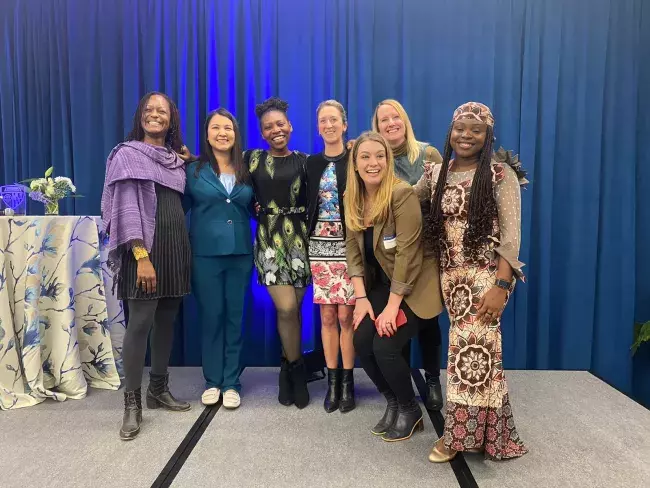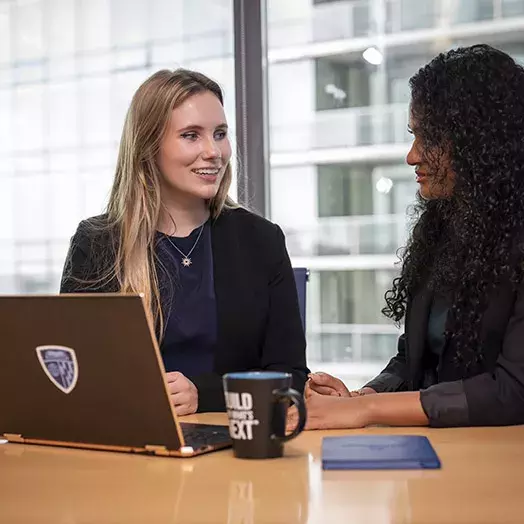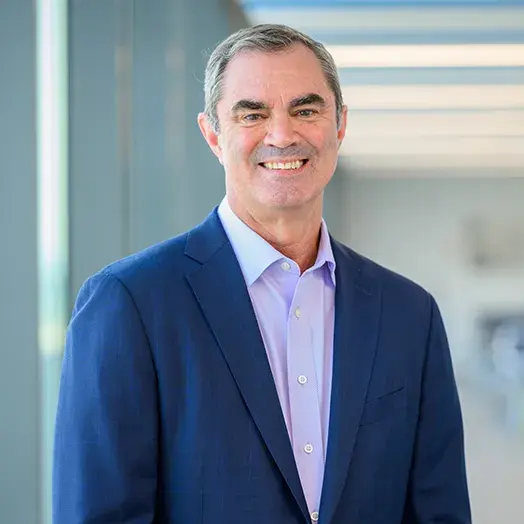A storytelling event highlighted the need to embrace equity in the search for not only equality, but also balance.

Eight stories of women who reach, balance, and embrace what it takes
The energy was spilling out into the hallway. This was a room buzzing with conversations, smiles, and a sense of anticipation.
On the first evening of Women’s History Month, the Johns Hopkins Carey Business School’s Women in Business group welcomed a Baltimore-based storytelling series for “Balancing Act: Stories About Crafting the Life You Want.” And before the attendees quieted to listen, students, faculty, staff, and guests from outside Carey were hugging one another. Not just cursory, barely-there, polite hugs. Big, full embraces.
In a time when it’s easy to register but hard to show up, here were more than 100 people of many backgrounds, ethnicities, and gender identities—students, professionals at the end of a long day, mothers and fathers—who wanted to share in the experience so much that they came at dinner time on a Wednesday for themselves, and for each other.
Embracing recovery
Sarenka Smith is a 31-year-old content strategist and marketing consultant pursuing a full-time MBA at Carey. She is also a self-described writer, comedian, public policy nerd, skin-care connoisseur, and recovering addict and alcoholic. Her balance, she said, isn’t a result of the time she spends with her 91-year-old grandmother. Rather, the time is how she actively pursues balance. Her balancing act is a continual engagement with family, the individuals who support her recovery, and the individuals whose recovery she supports.
“As we grow older, and we experience more of life and realize we’re not terminally unique, balance does come more organically to us,” Smith told the audience. “But it’s always something we’re trying to figure out. What I appreciate most about my own journey and this [Women In Business] group is that we can walk through hell and back countless times, and come back with a better sense of balance and our priorities.”
Embracing unpredictability
Carla Paisley hugged Smith as they traded places between stage and side seat. Paisley is a social worker, policymaker for Lutheran Immigration and Refugee Services, advocate, birth doula, and Baltimorean who remembers watching the Mayflower trucks drive the Colts away. She’s also the divorced mother of five children ages 15 to 25. When she was expecting her youngest, she was also planning her third home birth, with a Black midwife, an experience Paisley specifically sought because she was reaching for something better.
“That midwife would understand that the pulse-ox [monitor] that’s used to gauge my oxygen saturation was not designed to pick up my skin tone,” Paisley shared. “That person was going to affirm what birth could look like for me, because for many women who look like me, that had been denied. Women who labor like I did tended to not be believed.”
Baby had come not exactly according to plan: at home, yes, and with that midwife, but breech. And Paisley’s husband was stuck in a Chicago snowstorm. Later, when Paisley’s struggle for balance contributed to the end of her marriage, that baby and the four who had come before provided her equilibrium.
Embracing struggle
“I don’t know how to be still,” said Dolly Michira as she took up her space behind the microphone stand, trying not to sway away from its amplification. Her sister, she said, had been in a paralyzing accident at home in Kenya years ago. Michira cared for her, but over time, compassion fatigue led to hiring caregivers, and Michira came to the U.S. to pursue her full-time dual MPH/MBA degree at Carey.
This was supposed to help her rebalance. Instead, she said, it led to some of the lowest moments in her life. She was alone, and found herself in an unsafe living situation. Her family was calling her; things weren’t going well. Her sister’s paid caregiver had disappeared. They wanted her home. Michira had lost her passport. The hopelessness that filled her was crippling. But she and her family found solutions for her sister, and she now has a community of friends in her MBA program who hold her up and give her the space she needs.
“I’m grateful for the now-happy living situation that I have with someone that gives me peace of mind when I lock my room for privacy and not fear. I’m grateful for people who tell me they love me and care for me, because I need it when I’m so far away from home,” Michira told the audience. “Balance comes in moments of presence – being fully present in class, being present at home, and here” – she gestured to the room – “in the silence I hear now where I feel held and safe.”
Embracing a slow-down
The room took a break. The hugs continued. Then two attendees who had dropped their names – first names and last initials – in a box to offer their spontaneous stories were called forward.
Emily A. graduated from Carey Business School in May 2022, two weeks after suddenly losing the hearing in her left ear. Immersed in finals, she had put off getting it checked. About a month after commencement, an MRI revealed a brain tumor. Surgery didn’t get it all. She’s still deaf in that ear, still navigating the implications of the tumor’s space in her head. After all that time pushing toward her goals, she had to slow down, and learned that the world wouldn’t look at her the same way.
“I’m standing at the kitchen counter a week after brain surgery and people are asking me about my next interview,” she remembered. “Nobody was giving me the space to deal with the next wave.
“I’m unemployed still. [But] I’m going to get to the next thing. It just wasn’t immediate. I’ve learned to get comfortable with that.”
Embracing uncertainty
Shelby A. had been feeling isolated. The full-time student at the Johns Hopkins School of Nursing found out about this event two days before, while searching for things to do in town. She was a minority woman absorbed in studies in a new city. For her, goals and balance mean going out on a limb. She’d done that by coming to school, but as a result, there wasn’t much time to do it more. She hadn’t seen a real person in days. She thought she’d come and sit in a corner. But instead, she forced herself to sit at a table of people who welcomed her so warmly that they wound up giving her a tour of the building’s 24th floor.
“The balance is finding something that interests you, carving out the time to do it, putting on real clothes, Ubering, sitting at the table, putting your name in the box,” Shelby said. And then: “I’m going to go home tonight and feel so good because I did this for myself.”
The audience erupted in hoots and cheers as she stepped away from the mic.
Women at Carey
Embracing opportunities
Trishala Khatri is a full-time Carey MBA student from Nepal who grew up so cloistered that she didn’t have a male friend until she came to the U.S. for college at age 17. Her experience started with the culture shock of ringing laughter when she, as Nepalese tradition would have, asked a professor’s permission to enter a room full of students. A year later, stranded outside her flooded apartment in the middle of the night with no one to call, she wondered why she ever thought that studying in the U.S. might bring balance to a life of patriarchal control. But then she remembered what being home was like. Her mother had two master’s degrees while other women never got an education. Her sister, disabled from a birth injury, couldn’t access the opportunities Khatri had.
“All of that flashed in my mind as I was standing in the rain, and I thought, ‘I can’t quit right now,’” she recalled. She began building connections, started or led multiple organizations, danced in a dance company. She won Student Employee of the Year two years in a row, and graduated summa cum laude. For Khatri, balance was about being engaged with others and herself.
“I came to the US with the motive to become a successful woman leader and build a comfortable life for my sister. I can’t change her past, but I can build for what’s next for people like her.”
Embracing discomfort
Katie Hildreth is a second-year full-time MBA/MSN candidate at Carey who came from Boston, where she’d been a pediatric and cardiac intensive care nurse. When COVID hit, hospital leadership called up her and other exhausted nurses to help in the emergency department. During a simulation to prepare for work outside her specialty area, Hildreth witnessed first-hand the racism that was happening in ED spaces every day, levied by an actor at her beloved nurse’s aide, a Black woman. When the simulation ended, Hildreth could do nothing but offer a hug. The nurse’s aide had whispered to her, “Katie, this is how I feel every single day.”
Hildreth, then a part-time MSN/MBA student, decided to switch to a full-time pursuit. Though she could have attended any of the institutions in Boston for free, she chose Baltimore, and Carey.
“Boston is very white. My family is very white. The background I come from is very privileged. I wanted to come to a city where I knew that I could learn,” Hildreth shared. “I had two interviews today with white men. Until I can sit in front of a Black woman and tell her I want to work for her, I think there are a lot of stories that need to be shared.”
Embracing time
Nigerian native Jessica Jesse Mambula, MD, had a childhood punctuated by gunshots and persistent fear of death and kidnapping. Her father died when she was 11. Walking home from school one day, she’d faced down a man with a knife. Circumstances of Nigeria’s economy once forced her to quit school, sell drinks, and braid hair.
In Mambula’s early teens, her mother took her to an orphanage, touching off a lifelong commitment to caring for young people. She earned her medical degree and cared for orphans in St. Kitts and St. Lucia before starting a foundation in Jamaica. But through all this, she had become very busy. She was eating her first meal of the day at 11 p.m. The anger she carried was coming out at other people. When a patient told Mambula she felt like she was dying, Mambula dismissed the concern and left to continue her day. When she came back, the patient had passed.
“My story is about balance not because I have everything figured out,” Mambula said. “It’s because I’ve made up my mind to become the best version of myself. The concept of balance has taught me to value time. Take your time to redefine balance, and don’t do it out of guilt. Sometimes I feel I have to give my all to everything, and my all to nothing. At the end of the day I’m so confused. And so I sleep. And that’s ok.”
What to Read Next

Diversity at Carey
Johns Hopkins Carey Business School is among highest percentages of female full-time MBA students in elite groupAn hour after Mambula had finished telling her story, attendees were still sharing the space. They had shown up for each other and for themselves. They were going home with a sense not that the challenge of balance or pursuit of equity had become easier in these hours, but that the community where they’d found themselves had heard and understood.
Among the stragglers was one woman who had come right after work. As the event began, she mentioned how tired she thought she’d looked when she’d glanced in a mirror. “I really wanted to be at home in sweats,” she said. “But this was worth it.”


